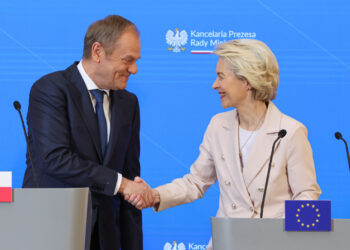Brussels – Putting on hold (or eliminating altogether) some of the principles of the CAP’s green architecture, the process of simplifying strategic plans, increasing the minimum contribution governments can make to their farmers in terms of state aid and mirror clauses in trade agreements: While nearly a thousand tractors put Brussels to the sword to protest EU policies again, the 27 European agriculture ministers meeting in the Belgian capital agreed today (Feb. 26) on the need to ask the European Commission for more medium- and long-term measures to provide relief to the sector.
The “measures to reduce administrative burdens” of the new CAP—presented by the Executive last week through an informal document—”go in the right direction, but they are not enough,” summarized Belgian Agriculture Minister and EU rotating President, David Clarinval, at a press conference at the end of the meeting, which was dominated by protests from farmers and trade associations (predominantly Belgian). It was precisely a delegation of protesters that was received in the early afternoon by the Belgian minister and the EU Commissioner for Agriculture, Janusz Wojciechowski, in the Europa Palace, where the meeting had ended a few minutes before.
After the #AGRIFISH Council, the Belgian Presidency and the EU Commissioner @jwojc received a delegation of farmers to further address their concerns.#EU2024BE pic.twitter.com/GzB9jqOPwy
— Belgian Presidency of the Council of the EU 2024 (@EU2024BE) February 26, 2024
Clarinval had invited the 27 governments in recent weeks to submit their suggestions to contribute to today’s debate, from which more than 500 suggestions emerged. The 27 delegations “are firm in saying that the situation cannot remain as it is. Measures need to be taken quickly and longer-term ones as well at the EU level” to meet the demands of European farmers. Further measures, most of which relate to the architecture of the Common Agricultural Policy, which was hardly agreed upon by Parliament and the Council in 2021 and did not enter into force until 2023, after a two-year transition period for about €336 billion until 2027 (about 31 per cent of the EU’s multi-year budget).
Among these, the debate focuses on flexibility on so-called green ‘cross-compliance’ (GAEC 6-7-8) that enables farmers to access CAP direct aid: specifically, minimum soil cover to avoid bare soil during the most sensitive periods (GAEC 6); crop rotation in arable crops, except for crops growing underwater (7); and minimum share of agricultural (arable) land dedicated to non-productive areas (8), already ‘waived’ by the Commission throughout 2024.
Not enough. Farmers and several member states, including Italy, aim to reopen the CAP discussion to adopt these and other measures at a more structural level without waiting for the new budget year. However, time is tight because of the European elections in June that will leave Brussels without operational institutions for a few months. So much so that the idea of the Belgian presidency at the six-month helm of the EU is just to “present inputs” to the next European Commission, but it is precisely the June elections that are pressing the Brussels institutions to continue aid and support for the sector.

Francesco Lollobrigida
Italy has called for a review of the CAP (Common Agricultural Policy), “which is quick. We call for developing production as a central element, guaranteeing the income of agricultural enterprises because without income, even passion is not enough to continue this activity, and without agriculture, there is no possibility of holding together a cultural heritage of wealth that this world represents and that is vital for Italy,” pointed out the Minister of Agriculture and Food Sovereignty, Francesco Lollobrigida, speaking with the press in front of the European Parliament, before taking part in the Council proceedings.
For the Italian minister, the current CAP “was poorly written; we call for substantial changes where the income of the farmer as a maintainer of the land is taken into account more than ideological positions.” Despite the tight timetable, according to the commissioner, it is not impossible to do this, and more importantly—he overreaches—it is possible to do it within the terms of the current legislature. “The EU Council could reopen the basic act of the CAP and revise the cross-compliance criteria. There is a majority in favour of this idea, and the European Parliament also supports an initiative from the Commission on this,” the commissioner explained, opining that, in theory, “it would be possible to do it even within this term if we want to do something quickly for farmers.” He then agreed with Lollobrigida that “the reform was adopted in circumstances different from the present. I think this consideration is very relevant.” The reality is that reworking the CAP texts is no small matter, and the European Commission, amid its pre-election campaign, to appease tempers keeps promising actions that it is unclear whether it will be able to deliver.
Structure of the CAP, but not only that. The ministers endorse the farmers’ line by also calling for an increase in the minimum contribution that governments can mobilize in state aid. “I will propose to the European Commission to do this so that” farmers “have more flexibility and a wider margin in terms of state aid in this difficult situation. Member states must have the possibility to support farmers in this crisis,” the Polish commissioner assured. Also on the table in Brussels are mirror clauses in trade agreements (after the Commission put the deal with the Mercosur bloc on hold).
English version by the Translation Service of Withub







